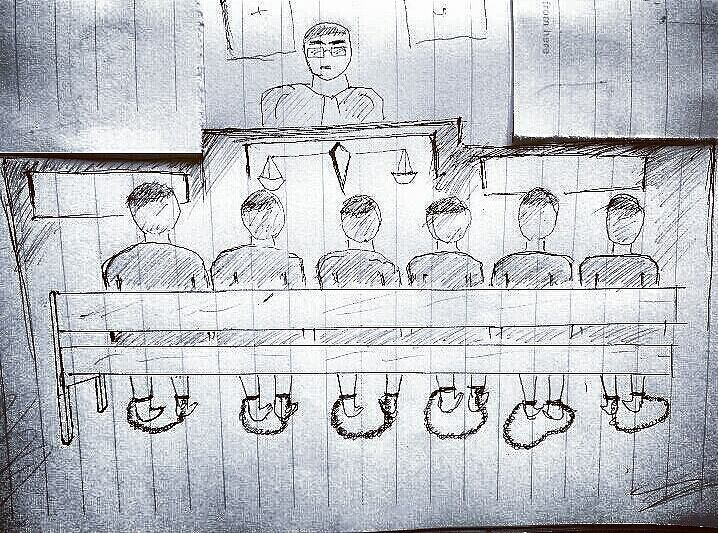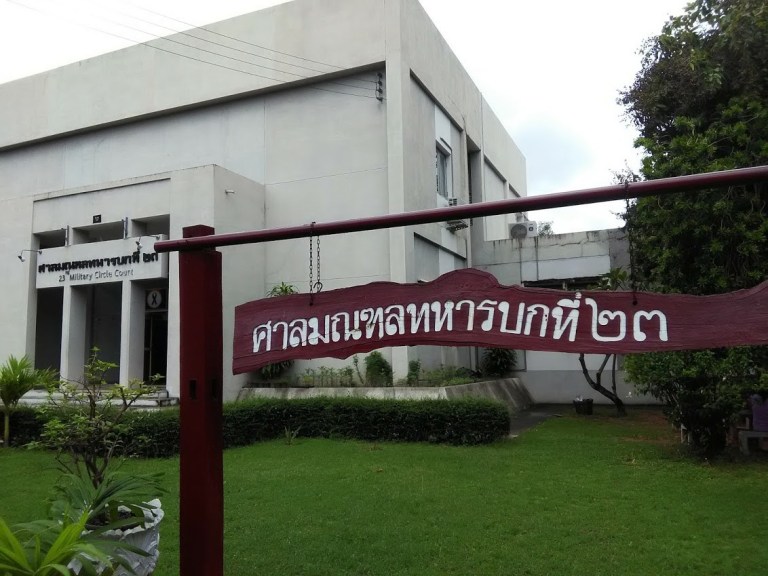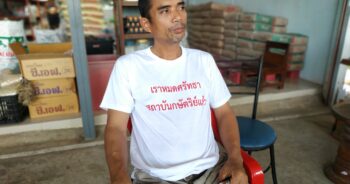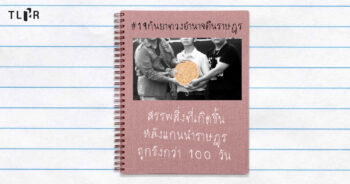The Royal Pardon Decree 2019 issued to mark the King’s Coronation in May has led to the pardon or reduction of prison terms of certain convicted prisoners, including those convicted on politically motivated charges such as the five core members of the People’s Alliance for Democracy (PAD) who had been imprisoned for unlawful occupation of Government House. They were released after spending around three months in prison.
A number of prisoners convicted under Article 112 of the Criminal Code (lèse-majesté), whose cases have reached the final verdicts, have also benefited from the reprieve and been released as well, including Jatupat Boonpattararaksa (aka ‘Pai Dao Din’) who was released on 10 May 2019, after two years and four months behind bars for sharing a BBC Thai news article; Thanat Thanavacharanon (aka ‘Tom Dundee’) who was released on 17 July 2019 after more than five years behind bars as a result of two cases concerning his public speeches; and Chanwit Jariyanukul who was convicted for distributing fliers and was released after serving his entire sentence for an Article 112 case, but was bailed out on 21 June 2019 for another case involving a bomb attack on the Criminal Court.
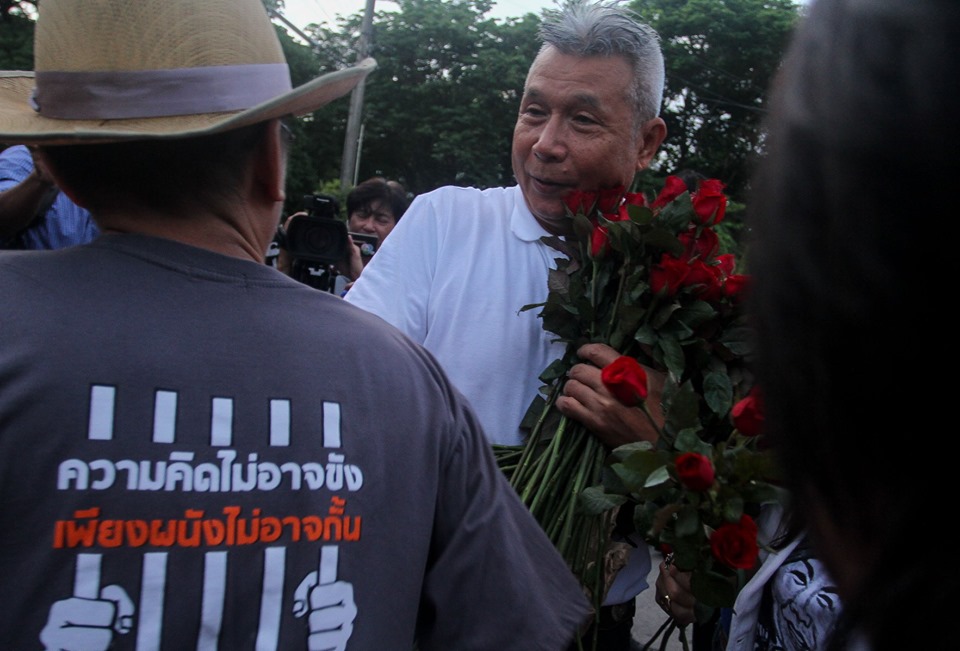
In June, more defendants in Article 112 cases were temporarily released after their remand in custody for extensive periods, including Siraphop Kornaroot, a political poet, who was charged as a result of writing and sharing his poems and proses online. Siraphop was bailed out after being arbitrary detained in custody for nearly five years. In another case, Suriyasak, a former core member of the Surin UDD (United Front for Democracy Against Dictatorship), who was charged for sending messages in a Line chat group, was also bailed out after having spent two years and three months behind bars while defending himself in Court.
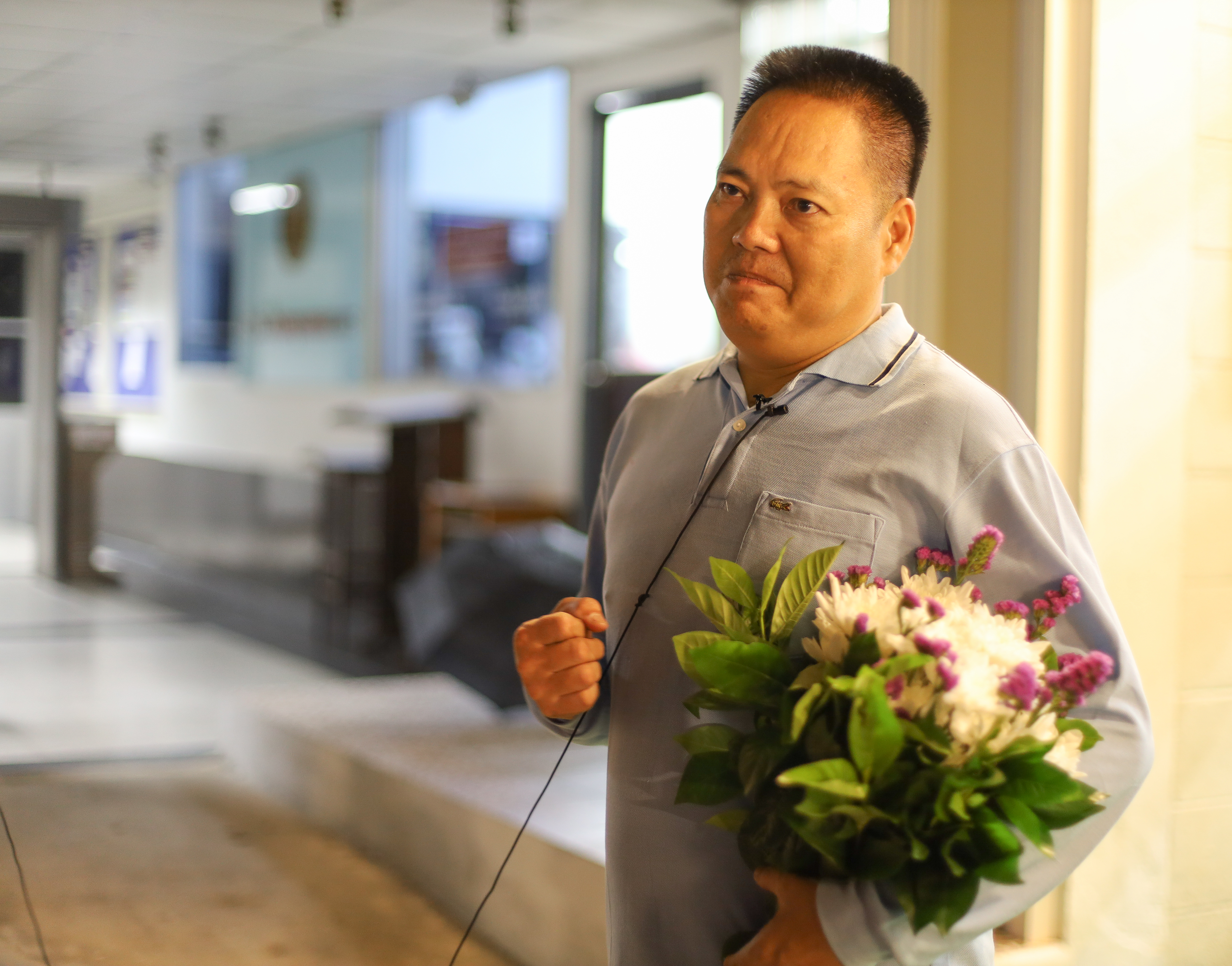
Nonetheless, many individuals who are alleged to have violated Article 112 are still behind bars, particularly those who have been convicted and whose cases have reached the final verdict. These individuals were sentenced to lengthy prison terms by military courts in the aftermath of the coup and have been imprisoned since. Another group is defendants in Article 112 cases who have been remanded in custody while fighting the charges, and have been denied bail due to their inability to post bail. They will remain in custody while they fight the charges.
Thai Lawyers for Human Rights (TLHR) found that, as of August 2019, at least 25 individuals are still confined in jails across the country, indicted for violating Article 112 of the Criminal Code as a result of the exercise of their right to freedom of expression. This number does not include those charged in Article 112 cases as a result of their committing fraud. TLHR does not know the exact number of individuals who fall under this category.
Convicted prisoners slapped with lengthy prison terms by military courts
At least 11 convicted prisoners in Article 112 cases remain incarcerated in jail. Most of them were arrested and tried in military courts following the 2014 coup. Each was alleged to have posted several online messages and pleaded guilty to the charges. Their sentencing in the military courts was calculated based on the number of messages posted; the more the messages, the lengthier the prison terms. The ‘sentencing guidelines’, aka ‘Yi Tok’, used to determine the proportionate sentence has also been increased to 7-10 years per count. This has led to the record sentencings in Article 112 cases. Additionally, as several such cases were put on trial when Martial Law was imposed, the defendants were stripped of their right to appeal to courts of higher instance.
According to publicly available information, Wichai, a salesperson for a private company was the person who was highest slapped with a record sentence for violating Article 112 under the National Council for Peace and Order (NCPO). Convicted by a military court, he was sentenced to seven years for each of the 10 messages allegedly posted by him, altogether 70 years. As a result of his guilty plea, his sentence was automatically reduced to 35 years.
Pongsak, a former tour guide from Kanchanburi Province was found guilty by the Bangkok Military Court for allegedly posting six Facebook messages. He was ordered to serve 10 years per message, altogether 60 years. Again, his sentence was reduced by a half, to 30 years, as a result of his guilty plea.
Sasiphimon, a former employee of a hotel in Chiang Mai Province and a single mother of two, was also slapped with an extremely severe sentence by a military court as a result of her allegedly posting seven Facebook messages. It was not clearly proven whether she had really posted the messages as alleged. Still, she was ordered to serve eight years in prison per message, or 56 years in total. Her sentence was reduced to 28 years. She has been serving prison time for over four years and six months now.

Thiansutham (aka ‘Yai Daeng Duad’), a Bangkok-based businessperson, was convicted by a military court for posting five Facebook messages and sentenced to 10 years per message, altogether 50 years. His sentence was also reduced by half, to 25 years.
Thara, the administrator of a health-related website, was charged on six counts for uploading audio clips by ‘Banphot’ on the website. Initially, he was determined to fight the charges, but given the protracted process in the military court, he eventually decided to plead guilty and was convicted and sentenced to five years per count. His guilty plea helped to bring down his sentence by one third, to three years and four months per count. Altogether, he was sentenced to 18 years and 24 months.
Burin, a member of the public who was arrested after participating in the “Just Standing” action in 2016 for calling a release of the political accused, later found himself charged with violating Article 112 as a result of a chat message he allegedly sent to Patnaree Charnkij, mother of a former prominent student activist ‘Ja New’ and another message he posted on Facebook. After his guilty plea, the military court sentenced him to 22 years and eight months for the two counts. His sentence was reduced to 11 years and four months.
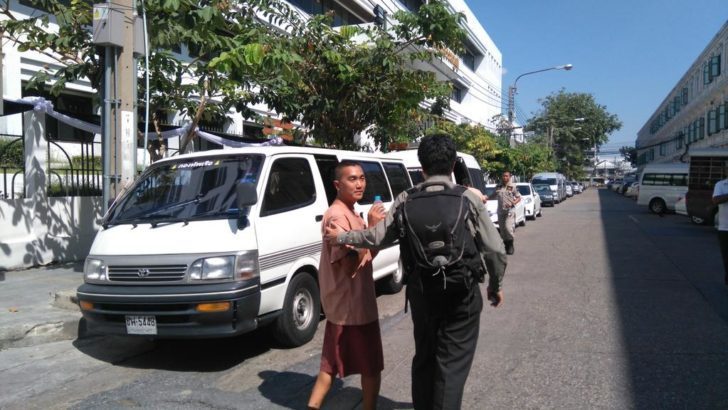
Chayapa, a former accountant for a private company, was arrested for allegedly posting a Facebook message about a counter-coup. She was later charged with violating Article 112 as a result of two other online messages she posted. Three additional online messages also landed her a charge for violating Article 116 of the Penal Code (sedition). She was then brought for an arraignment at the military court, unknown to her relatives and lawyers. There, she pleaded guilty as charged and was sentenced to 19 years of imprisonment. Her sentence was then reduced to nine years and six months.
Piya, a former stockbroker, was charged with two cases for violating Article 112 and was tried in a civilian court. He decided to fight both cases. In the first case, it was alleged that he had posted the King’s image together with offensive content. Both the Lower Court and the Court of Appeals convicted and sentenced him to six years. In the second case, it was alleged that he had posted a message and sent an email with content offensive to the monarchy. He was convicted and sentenced to eight years by the trial court. Altogether, the two cases landed him 14 years of imprisonment.
Even though these individuals, incarcerated under Article 112, have had their prison time reduced over the years by virtue of various Royal decrees and pardons, many remain incarcerated and are still required to serve the remainder of their lengthy sentences.
Group 8: Royal arch arson inmates
Another group of prisoners who remain incarcerated in prison despite later not having been convicted are those indicted for violating Article 112 for having set alight the decorative arches honoring the King in various locations in Khon Kaen in early May 2017. There are eight individuals altogether.
Those indicted can be divided into two groups. The first group includes nine individuals who were initially held in custody. They faced four separate cases; three as a result of their alleged crime in different locations and another against the defendant who was a minor and was indicted by the Juvenile Court. Charges against them included: being members of a secret society, conspiracy, being complicit in the commission of arson, mischief, and violating Article 112. All of them pleaded guilty as charged. As to the cases tried in the Phon Provincial Court, the eight defendants were sentenced to different jail terms.
Later, six minors decided to appeal in two cases. The Appeals Court Region 4 decided on 18 September 2018 to acquit them in two cases concerning the violation of Article 112. But the Court has found all of the defendants guilty in other charges and differently sentenced them from three to four years and six months to such unsuspended sentences. In both cases, they were sentenced to three to nine years of imprisonment.
In the second group, the two defendants, Preecha and Sarote, were arrested later. They faced the same charges however, and were indicted in three of the cases. Both pleaded guilty as charged in all three cases and on 18 June 2018, the Phon Provincial Court decided to acquit them of the three charges under Article 112. The Court, however, convicted them on other charges and sentenced them to 12 years and six months in prison each.
In the royal arch arson cases, the two defendants in the first group who did not appeal the verdict have been sentenced to two years and six months in prison each for violating Article 112. After serving more than two years in prison, they were released as a result of having their sentences reduced by Royal decrees and pardons. Though acquitted of the lèse-majesté charges (six minor defendants of the first group and two defendants of the second group), they remain incarcerated as a result of convictions on other charges. It is important to bear in mind the trial process in such cases concerning Article 112 as well because an initial charge was a lèse-majesté law.
Six defendants in the botched sabotage of the ‘Bike for Dad’ event
Another group of individuals who have been detained in prison includes the six defendants accused by the NCPO and military authorities of plotting a plan to sabotage the ‘Bike for Dad’ event, scheduled to take place in December 2015.
The five individuals were indicted by the 23rd military court in Khon Kaen in two cases. Pol Sgt Maj Prathin and four other persons (Weerachai, Wallop, Pahiran, and Thanakrit) were charged with violating Article 112. They were accused of verbalizing in a chat three statements deemed offensive to the King and the Heir Apparent in the presence of two well-known persons.
In another case, Pol Sgt Maj Prathin and another person (Nutthaphon) were charged with violating Article 112 and the Computer Crime Act, on two counts, as a result of Line messages they sent to each other and a note in Pol Sgt Maj Prathin’s diary. Pol Sgt Maj Prathin was the only defendant who faced two cases at the same time.
The two cases against them were unconvincing due to the fact that the six defendants were presented with information about the arrests and warrants issued against those planning to sabotage the ‘Bike for Dad’ event during a press conference. However, it turned out that all of the defendants later faced Article 112 charges that were entirely unrelated to the alleged sabotage of the ‘Bike for Dad’ event, which had prompted the press conference in the first place. According to the charges, the alleged chat seemed to happen while they were being kept in prison. In addition, the other incriminating evidence derived from their personal Line messages and a note in a personal diary.
The six defendants have been remanded in custody at the Khon Kaen Prison for more than three years and nine months. Some of the defendants, who managed to raise money, had tried to apply for bail several times, but were all turned down by the military court. The others had no money with which to apply for bail. The six of them are determined to fight the charges. The military court decided to have a secret trial, however, now, their cases have now been transferred to a civilian court.
Change in the enforcement of Article 112 and the remaining legal cases
It should be noted that even though an emerged policy in the enforcement of Article 112 can be observed since early 2018, i.e. Article 112 was not seldom used for charging or prosecuting individuals, and there were no new prosecutions of Article 112 cases during this period (to Thai Lawyers for Human Rights’ knowledge), other laws including the Computer Crime Act or the sedition clause under Article 116 of the Criminal Code have been used instead to restrict freedom of expression.
Please see the report: Changes in Thailand’s lèse-majesté prosecutions in 2018
A major instance where individuals have faced prosecution related to freedom of expression in 2019 is in the cases concerning the Organization for Thai Federation. All of the suspects in this case were charged with violating Article 116 (sedition) and being members of a secret society. As far as we know, at least 19 individuals involved in this case have been charged. Two of them have been remanded in custody while fighting the charges, as they have no money to post bail. While they were not charged with violating Article 112, these are individuals who remain in custody as a result of their exercise of the right to political expression.
Meanwhile, several defendants charged with violating Article 112 during the time the NCPO was in power, and who have been bailed out, will still have to fight the charges against them. Due to the protracted process in the military courts, these cases have already lasted several years. In addition, the cases have now been transferred to the jurisdiction of a civilian court per the Head of the NCPO Order no. 9/2562 (2019), issued before the dissolution of the NCPO. It is vital to further monitor trials of the lèse-majesté pending cases by civilian courts.

